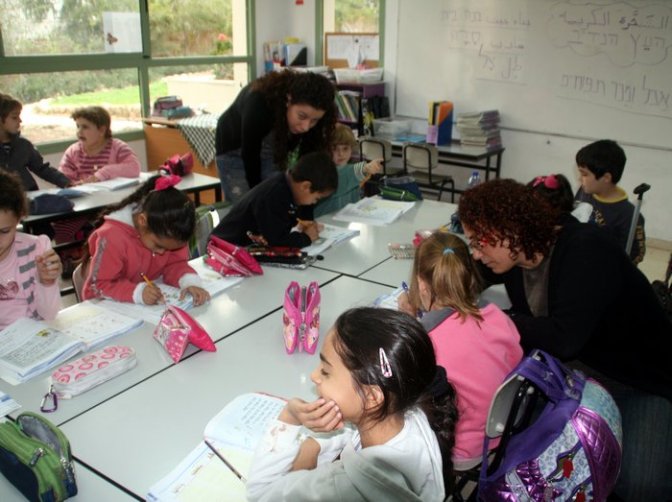Home > Oasis of Peace > Projects & Outreach > Children’s Educational System > The encounter is also for teachers
The encounter is also for teachers
A Weekend for staff of the Children’s Educational System facilitated by the School for Peace
Monday 26 January 2004

January 11: The second of three encounters for the staff and management of the Primary School and pre-school framework of Neve Shalom – Wahat al-Salam took place over the weekend. The two-and-a-half day encounter was conducted at conference facilities in Jerusalem and sponsored by the Arigatou Foundation, Japan.
The NSWAS school, like most others, is a place where the pressures of the school day make for frenetic activity among teachers and management alike. There is little time for reflection and deep consideration in an environment where the demands of the classroom, the pupils and the curriculum dictate what happens next.
But unlike other schools, the NSWAS school is at the same time conducting a unique binational encounter against a background of a national struggle. The encounter is not only between pupils, but also between teachers. The school cannot afford that this encounter will take place automatically, without consideration. Therefore, it tries to enrich the schedule of the staff with additional activities that will allow a deeper encounter to take place.
This year, a very important activity is underway. Thanks to a generous grant from the Arigatou Foundation, the School is conducting a series of serious encounters. There was no need to look far for a qualified team of facilitators: the School for Peace of NSWAS has long been engaged in just such work for other organisations where a binational encounter takes place (see the website of the School for Peace for more examples).
The first encounter took place in May 2003 in Nazareth. This gave the teachers the opportunity to get to know each other in a way they had not done before, and also established the subjects around which further encounters would focus.
This past weekend, the second encounter took place, and allowed the staff to dig deeper into the problems and the challenges of the binational dynamics of the school. The encounter looked at the climate of interaction there, and the perceived power relations between the staff.
Power relations is a concept that occurs again and again in the School for Peace approach. It is better to acknowledge than evade the issue of power relations in the interaction between staff members. Do Jewish and Arab teachers truly find that there is equality between them?
To help go into the discussion, SFP senior staff member Rabah Halabi gave a presentation proposing various models in which a multicultural encounter can take place. Of these models, there was a consensus that the NSWAS educational framework had chosen one in which there should be a complete and equal expression of multiculturalism.
A major issue proved to be language. Because Hebrew is dominant at the school, the Arab teachers feel that the Jewish “voice” is heard more than the Arab voice – and this affects the way decisions are made and the school functions.
To explore the issues, and how they might create a more equal framework, the 23 staff members taking part (almost the entire faculty), split sometimes into two equal discussion groups, and sometimes into uninational smaller groups.
The framework of the encounter allowed teachers who do not normally express themselves freely to take an active part in the discussion.
Some of the topics discussed were:
– A binational school has many benefits, but the cost – to teachers and students alike – can be very high: The demands of the system can lead to burnout among the staff, and unusual demands also on the pupils. Is it worth the price?
– Trying to maintain a progressive approach to education can run counter to the goal of maintaining equality between the dominant group and the less dominant group – how to juggle these two objectives?
– The Arab teachers feel that Jewish pupils have an easier time at the school. The demands upon them – such as to learn Arabic – are less, and they are treated with greater lenience.
– Both Jewish and Arab teachers feel that the Arab teachers enjoy a higher status at the school but, on the other hand, the Arab teachers feel that the demands upon them, such as the need to win the approval of Jewish parents, are higher.
The staff reached several conclusions during the encounter. They agreed that teachers must be more bilingual, i.e., that Jewish teachers must show greater proficiency in Arabic.
In classes, Arabic should be given preferential treatment, in order to equalize the use of the language in a situation where Hebrew enjoys clear dominance.
The encounter helped the staff to focus on the real essence of the school, and the challenges before it. Should everything at the school be analyzed in terms of Jewish -Arab relations? Indeed, it is not always easy for teachers to keep in sight the essence of the experiment taking place at the school, and it is often tempting to focus simply on the day-to-day task of teaching a subject well... “If I’m a good math teacher, why can’t that be enough?”
All the participants felt the encounter was very important and useful – and that the school must make time for further encounters like it. They also felt that despite the real challenges that emerged in the workshop sessions, the informal meeting between the teachers was very good, and constructive to establishing better relations between the staff.
The next encounter, which is scheduled for March 2004, will try to summarise what was learned from the process. It will look at the conclusions reached, and try to turn them into operative decisions.
(Article based on an interview with NSWAS educational system co-principals Faiz Mansour and Maya Karni)